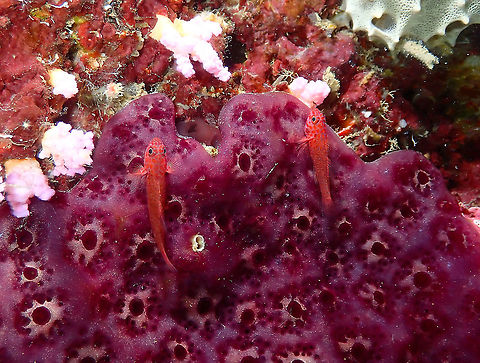
Appearance
Max. length: 2.3 cm. Dorsal spines (total): 7; Dorsal soft rays (total): 8-9; Anal spines: 1; Anal soft rays: 7 - 8. This species is characterized by the following: dorsal spine a little elongated or not; presence of a basal membrane between the pelvic fins; absence of predorsal scales; an interorbital but no postorbital trench; absence of cheek and opercular scales; fifth pelvic fin ray branched sequentially once or twice and, uniquely among known species of Trimma, has a bilateral, pupil-sized black spot on the branchiostegal membrane; live individuals with red spots, a little smaller than the pupil diameter on the head and nape, the posterior half of body has 3 yellow stripes separated by 2 grey stripes, and the black spots on the branchiostegal membranes are ocellated with white or blue.Distribution
Western Pacific: Japan to the Solomons.Habitat
Lives under corals in embayments, which are sometimes covered by siltation. Also found in caves and crevices of sheltered reefs. It often positions itself upside-down on the roof of the recess.References:
Some text fragments are auto parsed from Wikipedia.
http://www.marinespecies.org/aphia.php?p=taxdetails&id=278502https://www.fishbase.se/summary/Trimma-hayashii
https://www.reeflifesurvey.com/species/Trimma-hayashii
https://www.reef2rainforest.com/2020/02/02/a-definitive-and-free-species-guide-to-105-trimma-gobies/